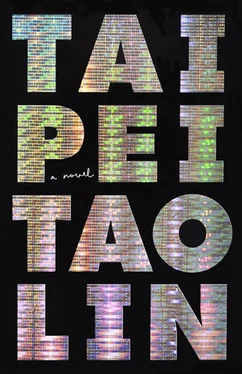Paul continued asking questions and was slightly affected by Erin’s extrasensitivity, it seemed, in not relating unsolicited information. Erin said Jennika had previously always been okay with periods without contact — with respecting the other person’s availability — and that after Jennika she had called her mother to say she felt scared that Paul didn’t want her to go to Taiwan with him.
“Why do you think that?”
“I started feeling paranoid. I felt like you didn’t want me around and I’m bothering you just by being around.”
“No,” said Paul shaking his head.
“You’ve been so quiet,” said Erin.
“I’m quiet from being depleted. I said I felt zombie-like.”
“I know, but I still felt paranoid. I thought ‘what if he’s just tolerating me. I’m going to be around him for the next three weeks.’ And things like that.”
“We’re depleted big-time. Don’t trust what you feel now.”
“I felt all this even after factoring in depletion,” said Erin, and Paul eased her into a lying position, on her side with her head on his lap, and alternated feeding her and himself pineapple chunks.
On the fully booked, thirteen-hour twenty-nine-minute flight to Narita, where they would transfer to a three-hour fifteen-minute flight to Taiwan, they had middle seats in consecutive, three-seat rows. Before takeoff, standing in view of the four relevant passengers, Erin asked if “anyone” wanted to trade seats for $40 so she could sit with her husband and was egregiously ignored except by the middle-aged woman, to Paul’s left, who said “no thanks” cheerfully, as if she’d misconstrued the situation to believe she was doing a favor by declining. Paul sometimes stood to lean forward and hug Erin’s head, massage her shoulders, or grin at her after certain lines of dialogue during Eat, Pray, Love, which they excitedly agreed to watch together and both felt nearly continuously amused by.
After the movie they stood hugging by the “lavatories.” Erin said she felt better than when she’d been paranoid, but seemed reluctant to reciprocate Paul’s enthusiasm when, with a child-like sensation of wanting to be encouraged to believe a fantasy, or that an aberration was the norm, he said, for the third time since getting on the plane, as if stressing the unexpected discovery of something worth living for, in an existence in which most things were endured, not enjoyed, that it seemed good they used “all those drugs and energy drinks” and hadn’t slept and still felt “okay.” Paul was surprised and confused when it occurred to him that if they felt almost anything other than happy, or at least content, Eat, Pray, Love (with its montages and fortune cookie — like monks and unacknowledged but knowing, it had seemed, usage of clichés) would’ve been incredibly depressing. He felt self-consciously, annoyingly optimistic when Erin reacted to this information, which had felt to him like an epiphany, with little interest and no enthusiasm, seeming less glad or curious than troubled, as if the message was to retroactively not enjoy the movie.
Before Paul visited his parents twelve months ago (which had been his first time in Taiwan in almost five years, during which most of the Taipei Metro, or Mass Rapid Transit, had been completed) he had no concept of Taipei’s size or shape or layout, only an unreliable memory of how many minutes by car separated certain relatives’ apartments and department stores. After using the MRT and idly studying its maps on station walls and Wikipedia, then walking between stations — to and from different routes, one night to six continuous stops, some days while far from his parents’ apartment to illuminate a distant area, placing a candle there for perspective, or as a reminder that there was more — he had, with increasing interest, begun to view and internalize Taipei less like a city than its own world, which he could leisurely explore, he imagined, for years, or maybe indefinitely, as it reconfigured and continued to expand, opening new MRT stations until 2018, according to Wikipedia.
To Paul, who’d stayed mostly in his uncle’s sixteenth-floor apartment on previous visits, the vaguely tropical, consummating murmur of Taipei, from his parent’s fourteenth-floor apartment, had sounded immediately and distinctively familiar. The muffled roar of traffic, hazily embellished with beeps and honks and motorcycle engines and the occasional, looping, Doppler-effected jingle from a commercial or political vehicle — had been mnemonic enough (reminding Paul of the 10 to 15 percent of his life on the opposite side of Earth, with a recurring cast of characters and no school and a different language, almost fantastically unlike the other 85 to 90 percent, in suburban Florida) for him to believe, on some level, that if a place existed where he could go to scramble some initial momentum, to disable a setting implemented before birth, or disrupt the out-of-control formation of some incomprehensible worldview, and allow a kind of settling, over time, to occur — like a spaceship that has exhausted its fuel and begun falling toward the nearest star, approaching what it wants at the rate it’s wanted, then easing into the prolonged, perfectly requited appreciation of an orbit — it would be here.
Paul’s father looked the same as last year, Paul thought at the airport, except maybe, as part of a long-term change, a little more child-like, in his mindfully cheerful manner, seeming always slightly distracted by some earnest, interior activity, which Paul sometimes imagined to be the low-level focus required to retain the mysterious, untransferable, necessarily private wisdom that powered his contentment. Paul thought of how, as one aged, more people became comparatively younger, so that, among an increasingly child-like population, one might unconsciously behave more like a child. While buying bus tickets, then waiting for the bus, Paul’s father said he had found Paul’s Taiwanese publisher on the internet and called them — learning it was one person, in his apartment — and arranged for Paul to give a reading for the Taiwanese edition of his first novel on Christmas, its release date.
On the bus Erin slept with her head on Paul’s lap. Paul’s father slept one row behind. It was around 10:30 p.m. Paul stared at the lighted signs, some of which were animated and repeating like GIF files, attached to almost every building to face oncoming traffic — from two-square rectangles like tiny wings to long strips like impressive Scrabble words but with each square a word, maybe too much information to convey to drivers — and sleepily thought of how technology was no longer the source of wonderment and possibility it had been when, for example, he learned as a child at Epcot Center, Disney’s future-themed “amusement park,” that families of three, with one or two robot dogs and one robot maid, would live in self-sustaining, underwater, glass spheres by something like 2004 or 2008. At some point, Paul vaguely realized, technology had begun for him to mostly only indicate the inevitability and vicinity of nothingness. Instead of postponing death by releasing nanobots into the bloodstream to fix things faster than they deteriorated, implanting little computers into people’s brains, or other methods Paul had probably read about on Wikipedia, until it became the distant, shrinking, nearly nonexistent somethingness that was currently life — and life, for immortal humans, became the predominate distraction that was currently death — technology seemed more likely to permanently eliminate life by uncontrollably fulfilling its only function: to indiscriminately convert matter, animate or inanimate, into computerized matter, for the sole purpose, it seemed, of increased functioning, until the universe was one computer. Technology, an abstraction, undetectable in concrete reality, was accomplishing its concrete task, Paul dimly intuited while idly petting Erin’s hair, by way of an increasingly committed and multiplying workforce of humans, who receive, over hundreds of generations, a certain kind of advancement (from feet to bicycles to cars, faces to bulletin boards to the internet) in exchange for converting a sufficient amount of matter into computerized matter for computers to be able to build themselves.
Читать дальше












